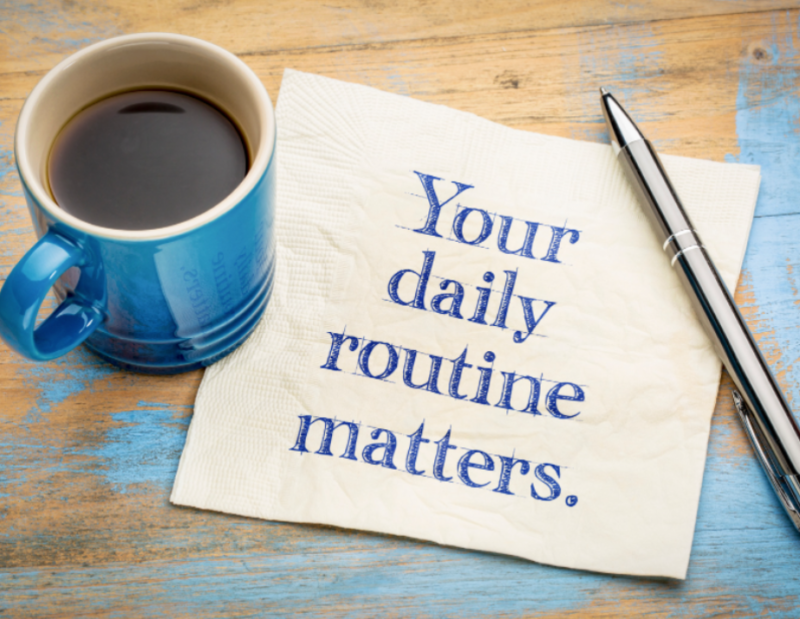Structure. Routine. Discipline.
What do these words mean to you?
For some, they represent safety, sameness, predictability. Others feel stifled or even oppressed by what these concepts represent. Our previous experiences – or lack of experience – with structure and routine will often color how we feel about embracing these tools in recovery.
Whatever these words evoke for you, remember: structure and routine are absolutely essential pieces of a healthy, sustainable recovery lifestyle. You don’t need to go overboard and schedule out every minute of your day, but you do need to work in regular times for the “building blocks” of health and recovery on a daily basis. Your recovery routine can and should be unique to you, but there are some general rules of thumb that will apply across all recovery routines.
Today, we’ll look at why routine is so important in recovery, learn about the building blocks of a healthy routine and explore why routine is especially critical for dual diagnosis patients who struggle with mental health concerns in addition to substance use disorder.
The Importance of Creating a New Normal in Early Recovery
Stress and boredom are the two biggest reasons patients cite for relapse after a period of successful recovery from active addiction. Developing a regular routine goes a long way in fending off both of these relapse triggers before they become overwhelming.
Early recovery – say the first six to twelve months of sobriety – is a delicate time. “Getting clean” is the first hurdle, but what comes after is usually the real challenge. It’s not easy, but many of our patients have “gotten clean” for short periods of time, usually on their own without any professional treatment. Many will do this repeatedly before seeking professional help. That’s because it’s staying clean that ultimately represents the biggest challenge for these patients.
One key piece that’s sometimes missing in the picture for these patients is the presence and determined cultivation of a “new normal” to replace their old routine.
Creating Newer, Healthier Habits to Replace Old Behaviors
It’s often said that those in active addiction don’t have a routine. This is actually a common misconception. It’s true that it’s very difficult, if not impossible, to maintain a healthy routine in active addiction, but active addiction is actually marked by a very definite pattern of behavior that is actually strongly routine-based.
While healthy routine pieces, like sleep, nutrition, work, self-care and community connection are often thrown into chaos, when you’re using, life quickly organizes itself around your substance of choice. In active addiction, your routine might look something like this: wake up (if you slept), feel awful, seek your drug of choice or otherwise make plans to use later that day, do whatever it is you need to do to secure those plans, spend time thinking about using, use, and feel guilty for using again. Then repeat the cycle, again and again.
As you move through this routine, you’ll likely go to the same places, see the same people, use the same substances, and feel the same feelings again and again. It’s a routine.
The Building Blocks of a Healthy, Sustainable Recovery Routine
While your routine in active addiction is built around using, your routine in recovery is built around your health. The building blocks are different for every patient, but they fall into several predictable categories. They are:
Sleep
Prioritize 8 hours of sleep every day, at the same time every day. Engage in a bedtime routine of some kind. Keep good sleep habits, also known as “sleep hygiene.” Bedtimes, bedtime routines and even individual sleep durations vary a bit from person to person, but all healthy recovery lifestyles rely on the backbone of good, solid sleep.
Movement
We need to move our bodies to experience our best health. Whatever kind of “exercise” you feel is doable for you, start there. For some, it’s walking; for others, it’s gardening. Some patients rediscover their love of team sports, lifting weights, dancing or swimming. Even cleaning the house or mowing the lawn counts. Make time to move your body everyday.
Nutrition
Regular meals and snacks. Plenty of water. A balanced diet. Getting enough calories in the day and the right balance of nutrients is a matter of huge importance to your health. At Shanti, we help patients develop a recovery nutrition plan that works for your lifestyle.
Recovery Support
Make time to engage your recovery plan everyday. For some, that means remembering to take medication everyday. For others, that means attending meetings, talking to a sponsor or peer support person everyday. For others, that means attending religious services and observing a daily prayer time. Find what nourishes you and schedule it into your day, every day.
Fun
Recovery without fun is NOT sustainable. Scheduling “fun time” is absolutely essential to a healthy recovery lifestyle. Fun is often one of the first things we forget how to do sober. Relearning how to have fun without drugs and alcohol is a big part of building a life free from addiction. Make time for sober fun – whatever that looks like for you – everyday.
Looking for help in Portland Oregon? Ready to Make Your First Addiction Treatment Appointment at Shanti?
Interested to learn more about how we can help? Give us a call today to begin your journey to freedom from addiction!




